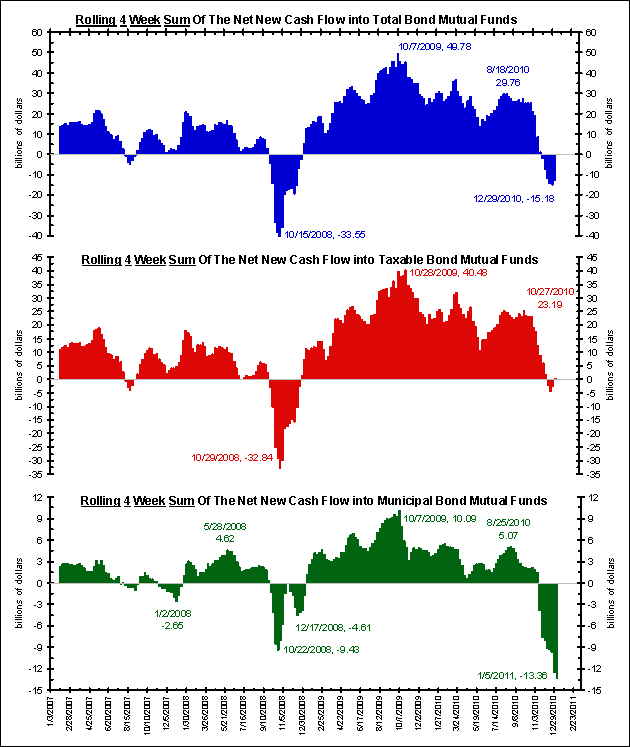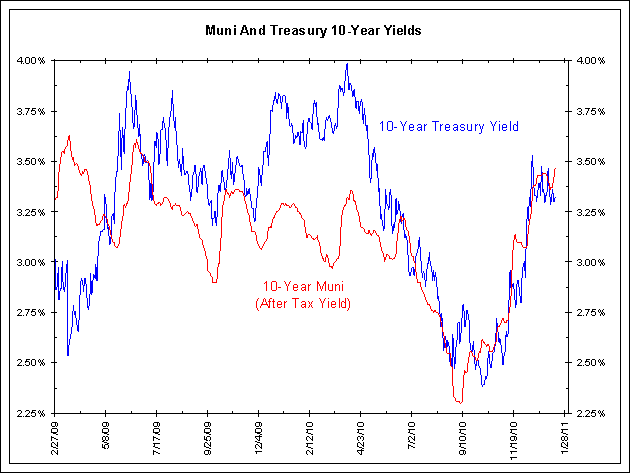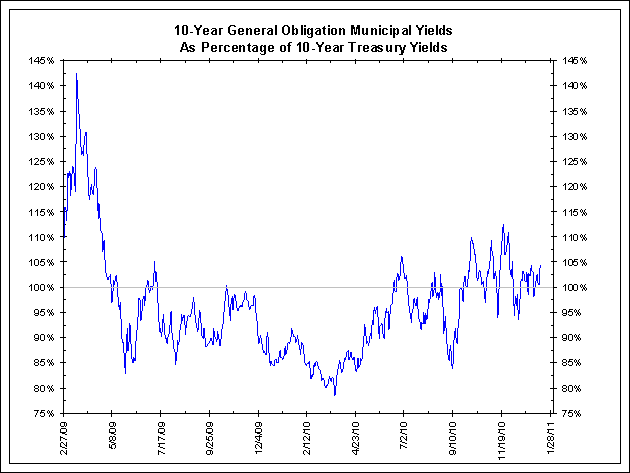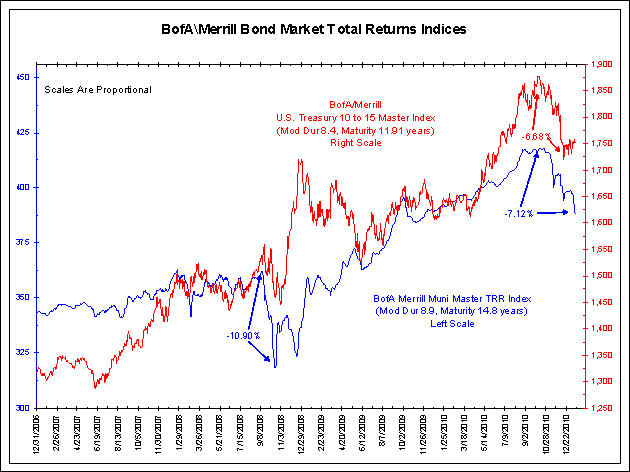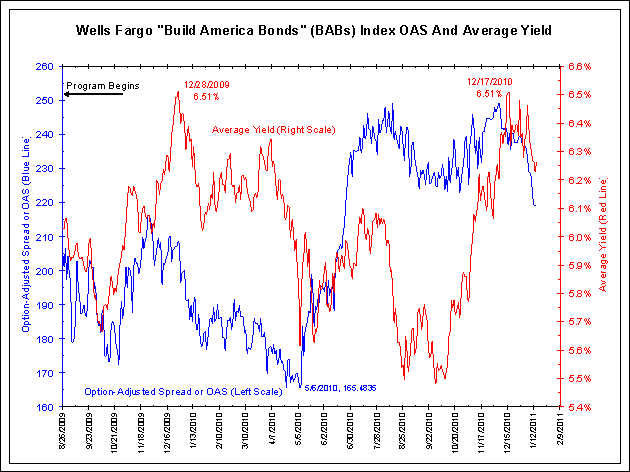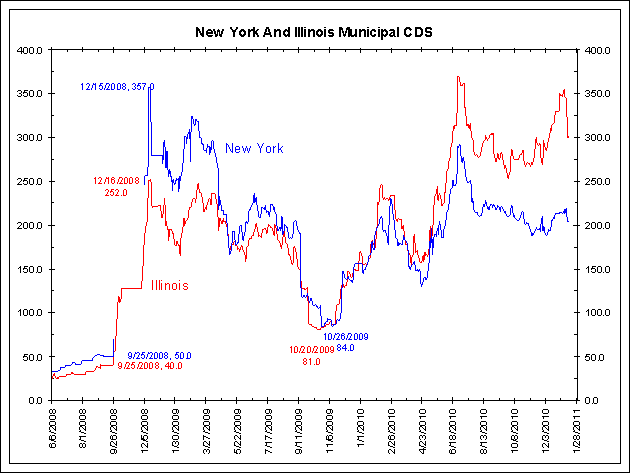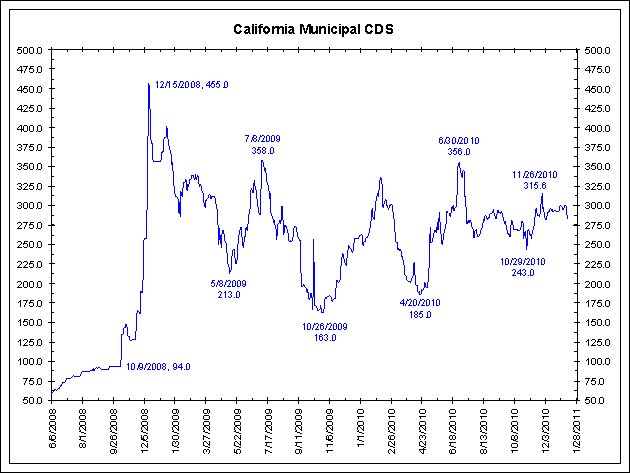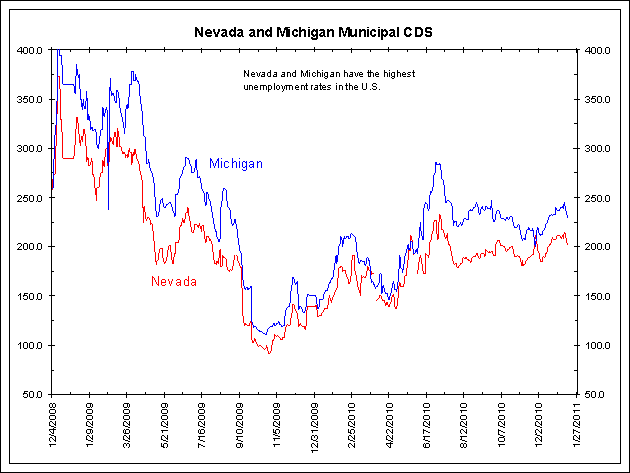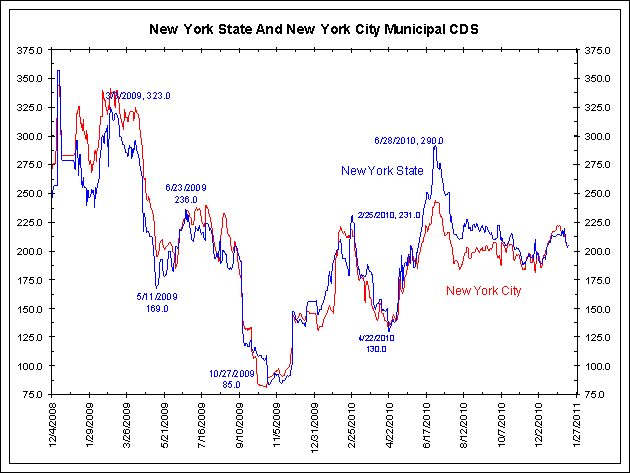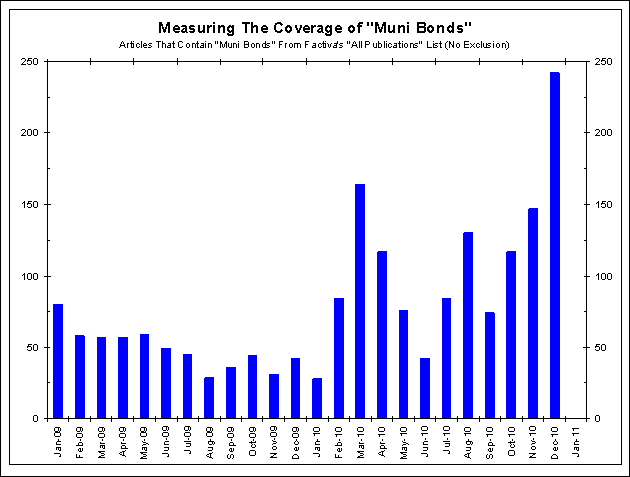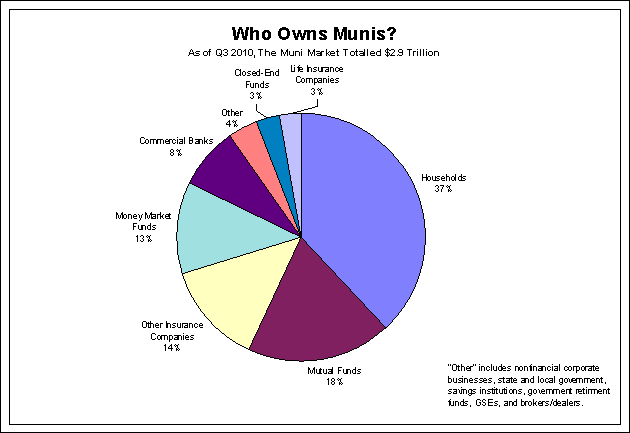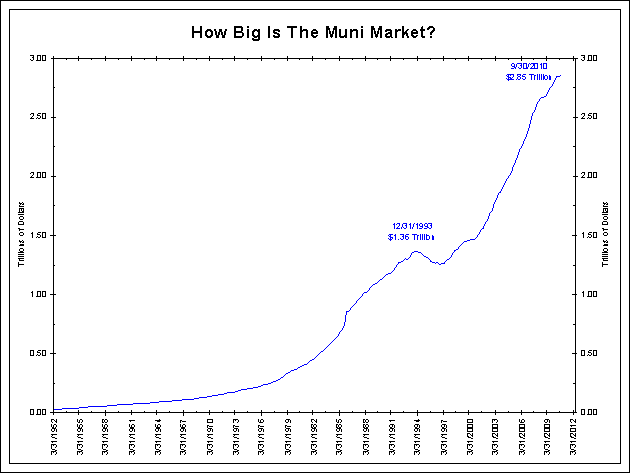Below is a chart of muni outflows (bottom panel in green). The rolling 4-week sum of net new cash flows are worse now than they were during the height of the 2008 panic when prices were plunging and the auction rate securities market blew up.
- Bond Buyer – Funds Lose $25 Billion In 9 Weeks
Outflows Prompt Pressure to Sell
Investors have withdrawn $25.3 billion — a sum that exceeds the gross domestic product of Panama — from municipal bond mutual funds the past nine weeks, according to Lipper FMI. Funds that report their figures weekly posted a net outflow of $1.51 billion for the week ended Jan. 12. Municipal funds are now reporting outflows at a rate of $3.25 billion a week, based on the four-week moving average. That’s well above any pace seen before the latest series of redemptions in the $478 billion municipal fund industry. The spate of outflows has fund managers scrambling to sell municipal bonds at a time when dealers are already worried about the willingness of retail investors to digest long-term tax-exempt paper, breeding considerable volatility and weakness at the long end of the yield curve. … Market participants have identified the culprit: headline risk. The mainstream press has barraged the retail investor community with a ceaseless drumbeat of muni credit fear-mongering in recent weeks.
<Click on chart for larger image>
Relative Performance Is Not Bad
The Bond Buyer story above implies muni relative performance is terrible and justifies the outflows seen over the past several weeks. The next series of charts show various ways to measure muni performance. If the relative performance is terrible, it is not evident in these charts.
To be clear, muni performance should be measured relative to the Treasury market, in much the same manner as other comparable parts of the fixed income market. As the first chart below shows, muni rates are heading higher, but so are Treasury rates, and everything else for that matter. Muni spreads are not widening, either relative to Treasuries or via the CDS market (a measure of “riskiness”). Several charts below show this. Despite similar relative returns in the taxable market and the muni market, taxable investors have been “hanging in” while muni investors are “running for the hills. “
These charts also show that muni relative performance was much worse in the fall of 2008, yet the outflows are larger now. It appears recent muni outflows are something more than just a response to poor relative performance.
Those who want to argue that the absolute performance now warrants record muni outflows also need to explain why taxable mutual funds are not experiencing record outflows. Additionally, absolute performance was worse in 2008, but outflows did not match those seen now.
(more under the next series of charts)
<Click on chart for larger image>
<Click on chart for larger image>
<Click on chart for larger image>
<Click on chart for larger image>
<Click on chart for larger image>
<Click on chart for larger image>
<Click on chart for larger image>
<Click on chart for larger image>
Bad Press Is Spiking
Something more than poor relative performance is driving muni investors out of muni bond funds. Could the press be partially responsible? Is the public being scared out of the muni market because of the stories they read in the papers every day rather than being driven out of their investments because of poor performance?
The chart below was derived from a word search of news stories using the Factiva database. It shows how many stories have been written about “muni bonds” each month.
Since early November, muni bond stories have been spiking. The media has no interest in writing a feel-good story about the muni market, so we can assume the large majority of these stories cast the market in a poor light. A casual review of Newsclips in recent days confirms this.
<Click on chart for larger image>
Can Outflows Become Self-Fulfilling?
We believe it is important to understand the catalyst behind the record muni outflows. Record outflows that are a byproduct of record poor relative performance are one thing. This is the natural reaction to poor performance and usually stops when performance stabilizes.
Record outflows that are news-driven are another thing altogether. They are emotionally driven and can be self-fulfilling. If the public is afraid of munis, good performance cannot bring them back. See our post last week about stocks. The public started leaving domestic equity mutual funds six years ago (2004) and even a near doubling of the S&P 500 since March 2009 could not bring flows back. The risk is a similar trend could be occurring with munis.
Credit crises have a way of being self-fulfilling. If investors decide a problem exists with munis and leave, a financial crisis will ensue despite a state’s financial position. This is especially the case with the muni market.
As the following chart shows, 55% of the muni market is owned by retail investors – 37% by households and 18% by mutual funds. Mutual funds are another way for households to own muni bonds. If mutual fund outflows are signaling retail investors are leaving the muni sector, it will be hard for the other categories shown below to make up for this loss. Further, since munis have not really underperformed as explained above, why should these “cross-over buyers” emerge right now?
<Click on chart for larger image>
Conclusion
The bad news about munis started right after the mid-term elections. Those elections saw a historic turnover in governors mansions and state legislatures.
We understand that it is politically expedient for these legislators and governors to talk “fire and brimstone” about their budgets to force compromise. And in many cases they are correct.
But they have to be careful. If they scare investors away now, and the munis mutual fund outflows suggest this might be happening, then their projections that they have several years to deal with their budget problems will be collapsed to the next several weeks. If investors stop buying your bonds, you’re insolvent now.
While we don’t think this will be the case, it is unsettling that the majority owner of munis (retail) seems to be running away from this market because of bad press. State level politicians that think scaring these munis investors help them get leverage in political negotiations are playing with fire. Once/If the movement to the exits becomes a sprint, it is hard to get it to reverse.
<Click on chart for larger image>
